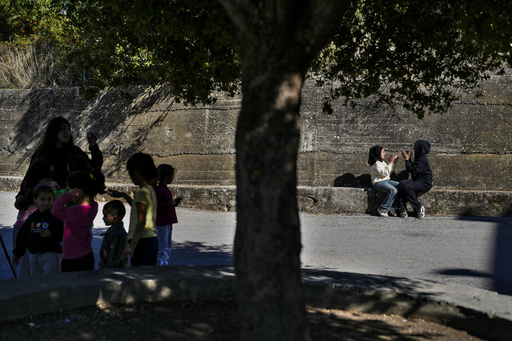
“`html
AITO, Lebanon — Dany Alwan stood in shock as rescuers sifted through the debris of what was once his brother’s residence, a three-story building that had been leveled by an Israeli airstrike in the serene Christian village of Aito just a day prior. His brother, Elie, had been renting out apartments to a friend who sought refuge there, fleeing from the onslaught in their southern hometown.
For several weeks, the situation seemed manageable, but everything changed in an instant. Shortly after some visitors arrived at the building, it was hit, resulting in nearly two dozen casualties, with half of those being women and children. The Israeli military claimed the attack was aimed at a Hezbollah official, a justification they have used previously, even when civilian losses are high.
This incident in northern Lebanon, particularly in a historically Christian area, marks a significant escalation as Israel has predominantly focused its strikes in Shiite-majority regions, including southern and eastern Lebanon, as well as the southern suburbs of Beirut. Residents in these traditionally “safe” locations, where many displaced individuals have sought refuge, are increasingly anxious. They feel torn between extending help to their compatriots and safeguarding their own families.
“We can’t welcome people anymore,” Alwan remarked as emergency personnel continued their search in the ruined village, expressing how the recent violence has dramatically shifted the local landscape. “The situation is very critical in the village, and this is the first time something like this has happened to us.”
Aito lies within Zgharta province, a region divided between Christian factions that either support or oppose Hezbollah. Some local politicians have publicly questioned the security implications of harboring displaced individuals, many of whom hail from the Shia Muslim community, voicing concerns that their ties to Hezbollah could pose risks. There are also fears that ongoing displacement could alter the demographic balance, affecting the Christian population’s status within Lebanon’s delicate sectarian political structure. The country, with its long history of sectarian conflicts, including a brutal civil war that spanned 15 years and ended in 1990, faces ongoing struggles with internal divisions.
The current conflict escalated when Hezbollah launched rockets at northern Israel in solidarity with Hamas amidst the Gaza crisis, prompting a contentious response from various factions in Lebanon. Critics argue this decision has led to calamity not just in Gaza, but within Lebanese borders as well.
In recent weeks, the Israeli military has ramped up its actions against Hezbollah, resulting in a surge of aerial bombardments and ground offensives. This has prompted a mass exodus, with approximately 1.2 million people displaced, many of whom left areas like southern Lebanon over the past month. Streets leading to Beirut have been choked with traffic jams as families evacuated, often with only the clothes on their backs.
The violence has struck a chord among many, spurring them to take action for fellow citizens, transcending sectarian divides. Michella Sfeir, who was safe in the north, felt compelled to help after witnessing a moment of kindness between drivers on the road and now volunteers at a women’s art center that serves as a community kitchen and donation site for essential supplies in Aqaibe. Displaced women frequently visit the center, and volunteers even deliver meals to shelters during dinnertime.
Sfeir shared that they often face skepticism about helping the displaced, with some community members questioning their motivations and expressing prejudice. “Some people … would ask us ‘Why are you helping them? They don’t deserve it; this is because of them,’” she said, reflecting on the tension within the community.
As anxiety surges in northern coastal cities such as Byblos and Batroun, which have been mostly unaffected by direct conflict, the fear of impending violence looms large. A recent Israeli drone strike that killed a couple on the Jounieh highway has only added to the uneasiness among local residents. The question circulating is whether to assist displaced individuals at the potential risk to their own safety or to abandon humanitarian efforts altogether.
Zeinab Rihan fled from the southern Nabatiyeh province with her family as the airstrikes came closer. However, upon arrival in the north, she found the situation difficult, with many landlords quoting exorbitant rents, seemingly to deter them from settling in their properties. This likely stems from both personal biases and a deep-rooted fear of reprisals.
In a nearby northern town, a local resident noted that while the government was hesitant to accept displaced families, pressure from the community led to a change of heart. Emphasizing a shared humanitarian spirit amid security concerns, they expressed a collective desire to assist those in need.
Similarly, in the village of Ebrine, residents have rallied to support displaced families sheltered in local schools, even employing them for seasonal work, despite nearby Israeli strikes. Back in Aqaibe, displaced women have started assisting in Sfeir’s kitchen, collaboratively preparing meals and sharing moments of solidarity.
Flavia Bechara, who heads the community kitchen, articulated a deep connection to the broader region, stating, “We all used to eat the olives and olive oil of the south, and we used to go there to get fruits and vegetables.” Despite facing scrutiny and questions about their actions, she remains steadfast in her mission.
Admitting that anxiety is always present, Bechara described a palpable fear of escalation that could reach their location at any moment. “There’s always (the fear) that what is happening there can happen here at any moment,” she concluded, underscoring the fragility of the current peace.
“`
